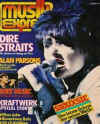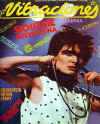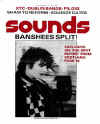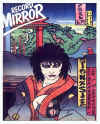|
PSIOUXDIE'S CORNER
But enough of the innate fallacies of Empirical Romanticism
- can't we just talk about leather underwear.
"No," cries Ian Penman sternly, "I
insist we talk about the innate fallacies of Empirical Romanticism - or
if you're really in a hurry, how about the onset of Western
Stoicism?"
"But can you take pictures of it?" asks
Pennie Smith
Scene 1: Into The Commercial Zone!
Movement along these passages is without friction,
skipping and rapid, often headlong, as if on prefect rock 'n' roll
roller skates. Parts of the long galleries are open to the
public. There are certain positions to sit in and watch the
ascents or descents, depending.
Fantastic pop music charts come by, big as
pantomimes; one has to go inside and search the numberless shelves
each revealing treats sharper and more modern than the last.
The labyrinthine path turns out to have been set up
deliberately to give the stranger a tour of the company. Meanwhile
the inspector (myself) feels obliged, impassioned and duty-bound to turn
some tables. Facts collected from previous interviews are turned
into states of affairs which may or may not be the case, previous
'agreements' turned into recommendations and warnings which may be
either correct and appropriate or incorrect and inappropriate. The
relation of the subjects to the symbolic or imaginary is the final
barrier. Beyond that...
Scene 2: The First Risk!
Siouxsie & The Banshees are convenient.
Our conversation, ostensibly to deal with their new
single 'Staircase', and their upcoming Rainbow benefit gig for the
National Society for Handicapped Children, was actually a long overdue occasion
for conflict. It concerned the relative claims to validity or
otherwise of the criteria which support the hitherto fairly inviolate,
heavy and heavily credible Siouxsie & The Banshees image.
If anything, the purpose of this article is to stress
that it seems impossible to either carry out or criticise the motions
and articulations of recent rock and roll independently of it's
political and ideological inclinations.
Listen to: don't just hear.
The role of instruments, techniques, institutions,
events, ideas and interests in rock was very much changed by the New
Wave. Rock and roll is healthier than it's ever been, true, but it
still needs to tighten up its outputs and input, interrelations,
passions and questioning. Revolutionary movements or moments such
as the New Wave show the desire to rearrange organisational
structures - playing, publishing, providing - and at the same time
replace redundant forms of identification.
Look at: just don't see.
An immense complexity characterises the appearance of
the concept of control of the rock medium. A succession of
different mystiques announce the presence of what appears to be a
vacuum.
Scene 3: The Empiricist's
New Clothes!
"Won't somebody assist me?/Solve this
mystery/Somebody assist me/Arrange the symmetry."
("Staircase") Siouxsie & The Banshees.
'At most, they expected to provide evidence of a
state of mind, an intellectual fashion, a mixture of archaism and bold
conjecture, of institution and blindness.'
- Michael Foucault
Siouxsie & The Banshees are irrelevant.
Empiricism is, crudely, the belief that knowledge
should be gained through observation and experiment, not through
theory. Empiricism and romanticism are two boils on the seat of
current beat music. Empirical argument - as provided by, for
example, Siouxsie & The Banshees, The Pop Group, This Heat, Brian
Eno and Danny Baker - tends toward common-sensical bias. Combined
with classic romanticism, it will produce investments in Art - and with
all the capital ambivalence that this both promises and affords.
But the real limits on expression must be clarified,
before we're overrun.
The first rule is no more biographies. Let's
find out instead about the regularities and restraints which actually
determine how something comes to be made, made public and publicly
accepted as understood (even when not). What actually gives
something value? What basis do the rock press generally work from
to determine something's
value?
Siouxsie says that "People keep picking on their
own reactions as rules..." That's
bad. I wholeheartedly agree. But don't
you deserve it, I wonder?
In common with many of their contemporaries, Siouxsie
& The Banshees like to present rock and roll as Art, and thus as
something which one finds oneself, naturally, quite incapable of
explaining or understanding.
The meaning of any music resides purely in the use to
which a spectator puts or fails to put it. Beyond this, meaning is
determined by common-sense dumb ideology or everyday commercial market
forces. Rock and roll therefore has no real strength or
resistance. Concerns, traditional or otherwise, simply don't
escape any dominant assumptions. They can't
do anything more than decorate, refine or polish already established
structures.
Let's not
pretend that there's no
planning involved in somebody's
use of restricted or elaborate kinds and codes of rock expression.
Let's not pretend that any
one entertainer is any more or less political than another. Let's
not even pretend that only a few have any chance of or interest in
effecting real change.
You either sustain or you subvert. You try to
control completely.
Scene 4: J'
Accuse!
The supercilious tone and mostly insubstantial content
of drummer Kenny Morris'
conversation suggest an ill-sorted sort of person suddenly elevated into
a position where he feels he might safely lord it a bit with the 'ol
intellectual facade.
The equally supercilious tone and apparent desire to
contribute a minimum to conversation that is guitarist Severin's
particular role, both suggest the same sort of person elevated into the
same sort of position. Severin, however, feels as yet unsure quite
how to lord it - although he is nevertheless determined to go ahead and
do so. Rock journalists are suckers for this one: the sour,
silent sage.
Bassist McKay and singer Sioux are fairly accomplished
by comparison.
Provisionally, the inspector is accused by Severin of
having made an 'infantile'
remark; the group are evidently unconvinced by certain comparisons
made in a Kate Bush album review (NME), late November '78):
'Lionheart'
starts with words which could easily slot into 'The
Scream'; 'Blue
on the walls, Blue out of my mouth';
but where a Banshee might follow that up with, say Blood on the walls,
blood out of my mouth...
Well, I reply, in all your interviews you seem to be
quite obsessed with control at various stages of the music
business. One of my doubts - but no means specific to you - is the
amount of control exercised over meaning, by which I mean image - and
aesthetic meanings, is the music press wholly to blame, for instance,
for your particular 'shock
horror' image? Don't
you leave yourself open to such things through ambivalent or ambiguous
expression?
KM: "Yes, we do. But it's
only certain things people pick up on, time after time after time."
So don't
you want to control it a bit more? I recall that, for instance, in
the recent ZigZag feature 'Staircase'
was described as being about 'unfathomable
mystery'. Doesn't
such ambiguous nonsense invite cockeyed aesthetic judgement?
Sioux: The song's
just taking a very day-to-day thing, and the nature of that thing is
very... mysterious."
In what sense? Staircases are mysterious?
What do you expect people to take away from that?
Sioux: "I want them to take what they want
from it. We've never
tried to control people's
reactions. It's just
people who should know better."
Scene 5: A Banshees'
Privileged Insight Into Real Life!
You don't
exist isolated inside the music biz structure. You're
part of it. Just on a pragmatic level, you're
part of the financial structures: Income, outcome, profit. You're
entangled in that up to your necks.
Scene 6: The Thing That Goes In Your Ear!
But what sort of information in or on a record do you
find relevant?
KM: "The vinyl itself... what is actually
on the vinyl."
The plastic object?
KM: "No, the thing that goes in your
ear."
OK, what's
it important to put in there? What's
going to alter people's
day-to-day misery?
KM: "I don't
say it will alter them. You do a thing, they can accept it or
leave it, but it will affect them, it won't
alter them. I'm
not worried totally about completely changing people's
attitudes, because I don't
have that kind of faith or belief in people. All I know is, it's
there and it's for them to
choose, they can take it or leave it."
I'd give
up if I were you.
KM: "If they alter, they alter. But
it'd be ridiculous to have
faith in the belief that you're
gonna alter masses of people. I'm
not talking about little London. I'm
talking about everywhere, the whole globe."
JM: "Why did you talk about
'giving
up'? I mean, if I give
up, this band falls to pieces. I don't
give up, I don't give up
creating. It comes out anyway."
But don't
you think there's a danger
there of subscribing to the belief that 'whatever
comes out' is holy:
the sanctity of the artist, the mystery of creation?
Sioux: "It's
not at all a mystery of creation - if there's
been a misunderstanding then that's
hard luck, but what comes out is a result of what you're
affected by, and it's around
everyone else."
Well, how do you think you affect
people?
Sioux: "Because they're
not being presented with a standard method."
It seems to me to be very much just a parallel
standard method: exchanging one set of 'mysteries'
for another.
KM: "They're
not 'mysteries'
- why is that a recurring word in this interview?"
Ambiguity?
KM: "NO, they're
obvious everyday things, but they're
sort of themes and relations that usually lie strictly under the carpet
in people's minds.
Rather than write about something that's
pure broad daylight, um, dole queue or whatever, there's
no mystery involved..."
But what change will that effect?
KM: "Change what?"
You're
saying... your lyrics are pointing at things and you're
hoping that people will go "Oh, yes, now I see!"
KM: "Not exactly. You can wipe that
off for a start. As I said, we're
not there to alter people, not exactly. We don't
have enough faith - I certainly don't
- in people."
'Faith in people' meaning
what? You have faith in yourself - you being a person,
presumably...
KM: "Of course I do. You can see our
album looking glossy in the racks, along with everybody else's,
and that's the way we want
it - that's
the way we know we're gonna
get over to so many people. We want it there in the media with all
the rot so that it'll shine
out."
Scene 7: The Phantom In Your Living Room!
If you don't
have 'faith in people', how
do you expect them to see it shining out? What if they're
not bright enough to perceive it?
KM: "Rubbish, no, it's
there in the racks, shining to everyone else's
eyes. They're not
blind."
You said you didn't
have faith in people.
KM: "No. Exactly. That's
why, for one instance, out goes a single like 'Hong
Kong Garden' which is
readily accessible. People won't
exactly - I'm sure - hardly
anyone I ever spoke to understood the lyrics, or heard them, but it was
a very good way of drawing people in. That person was excited
enough by that single - whether it was a kid in the street or a
housewife. We reached a whole range, a whole spectrum of people
who would go to a record shop and buy the album.
"Its there. Its in your living room.
We want Siouxsie & The Banshees to be a living room name."
Just another object in the living room that no-one
understands? I mean, what was Siouxsie & The Banshees a
reaction against, initially?
Sioux: "A reaction towards the falseness of
people maintaining that they were being very honest, expressive,
uncontrived and everything - and it wasn't
that, it was well thought out, well rehearsed..."
Aren't you
falling into the same trap? You said that the reason you didn't
make your own record was because you wanted it to be 'perfect.'
Sioux: "We wanted to do it one hundred per
cent."
You think, in other words, that there's
some perfect way of doing something?
Sioux: "The drive behind you is that you
want to do something as perfectly as possible, yet always after you
attempt that you realise the mistakes you made, and have to carry on
going up.
"We're
by no means satisfied by what we've
done. We're not smug
or satisfied. We haven't
really reached anywhere we think we will reach."
What are you reaching for?
Sioux: "Success."
In what terms?
Sioux: "Global terms. And in
ourselves, as impressing ourselves."
JM: "I don't
really think in terms of success. I think in terms of my
satisfaction. I don't
think I'm writing this tune
for the Banshees to be globally successful."
Sioux: "No, I didn't
say that."
JM: "You did in a way."
Sioux: "I said I want us to be, that's
not the reason why I'm doing
it."
JM: "Well that's
what you said in answer to the question..."
Scene 8: Ho Hum!
JM: "People can relate to records.
Not even on a heavy level; to have a record that they like and can
identify with - lyrics or even just the feeling put across, the sounds -
is, like, a great thing to have in their lives, for just a while, until
they get fed up with that album and need another one. It's
just, um..."
Production and consumption? One more
sharpysleeved, sharplyproduced, sharplyplayed, pop record. Who
needs it? (Well I wouldn't
mind a few more. - Ed.)
Scene 9: It's
A Free Marketplace!
Ah, the index of 'freedom'
as the right to aggressively idle, vagrant expression and opinion.
The right to the aggressively idle, vagrant Siouxsie & The
Banshees. Once again, I ask, what is it in the grooves which is so
valid?
Sioux: "For want of a better word, just, honest."
KM: "I dunno, I just think comparisons are
obvious if you're going to
ask a question like that. I don't
know what you expect us to sit here and say to that. Other than,
you know, we've got
confidence in our creativity, we know one hundred percent what we want
to do."
Damned if I do. Is it that you want to stick
honest things in the ears of people in whom you've
absolutely no faith, in the hope that they'll
prick up and plug into the great, glossy, global gestalt where
everything is evidently self-evidently supernatural, peeping out from
under the deep pile of the collective carpet?
What a useful project!
Scene 10: Siouxsie & The Interglobal
Building Society!
Nothing can stop them now, beyond... Reality.
Ian Penman 31/03/79
BACK
TO INTERVIEWS/ARTICLES INDEX
|









